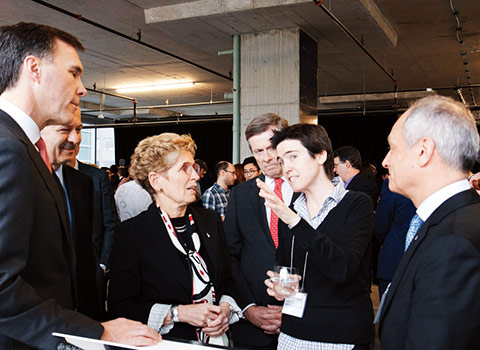A new institute is staking Toronto’s and Canada’s claim as the global leader in artificial intelligence – and a team of globally renowned U of T researchers helped create it.
Geoffrey Hinton, a University Professor emeritus in computer science at U of T and vice-president, Google Fellow, at Google, will serve as the chief scientific adviser of the Vector Institute – officially announced on March 30 – based in downtown Toronto.
The independent, non-profit institute, affiliated with U of T, will work with other universities and the private sector to attract the world’s leading minds in artificial intelligence and push toward the next made-in-Canada breakthroughs.
“The University of Toronto has long been considered a global leader in artificial intelligence research,” says U of T president Meric Gertler. “It’s wonderful to see that expertise act as an anchor to bring together researchers, government and private sector actors through the Vector Institute, enabling them to aim even higher in leading advancements in this fast-growing, critical field.”
After decades of being on the “lunatic fringe” pursuing an area of AI known as neural networks, Hinton, his colleagues and former students are now part of an incredibly in-demand “lunatic core.” Everyone is vying for their talents, from universities to AI startups to the giants of Silicon Valley. South of the border, U of T alumni and former faculty can be found leading AI divisions at Google, Apple and Facebook. Here at home, they’re creating startups such as Layer6 AI, WinterLight Labs and Deep Genomics, fuelling local demand for the same talent pool.
Hence the need for the Vector Institute.
The goal, the researchers say, is to have Vector serve as a magnet to attract and retain talent – including a large number of PhD students – to support AI startups and show that Toronto is serious about capitalizing on its reputation as a global leader in deep learning.
“If we don’t create this now, basically we’re going to miss the boat in the revolution of AI. It’s actually critical for this to [have] started yesterday,” says U of T computer science professor Raquel Urtasun, the Canada Research Chair in Machine Learning and Computer Vision. Urtasun is globally in demand for her work on self-driving cars – an important area of research at the Vector Institute.
The creation of Vector couldn’t have come at a more important time. Toronto and Canada are currently at the forefront of AI, but many countries are racing to take the lead. Vector will share $125 million in federal funding with fellow institutes in Montreal and Edmonton. The Province of Ontario will invest $50 million, and more than 30 top Canadian and global companies are set to contribute up to $80 million. The institute will also work closely with other Ontario universities with AI talent.
“I think in the next 10 to 20 years almost all aspects of Canadian society will be impacted by artificial intelligence from farming to medicine to education,” says Brendan Frey, a U of T professor in electrical and computer engineering and founder of AI startup Deep Genomics. “Artificial intelligence is the best way to interpret data and then make rational, good choices. . . . You can think of AI as a pervasive technology that’s going to make life better across the board in all aspects of society.”
Recent Posts
For Greener Buildings, We Need to Rethink How We Construct Them
To meet its pledge to be carbon neutral by 2050, Canada needs to cut emissions from the construction industry. Architecture prof Kelly Doran has ideas
U of T’s 197th Birthday Quiz
Test your knowledge of all things U of T in honour of the university’s 197th anniversary on March 15!
Are Cold Plunges Good for You?
Research suggests they are, in three ways




